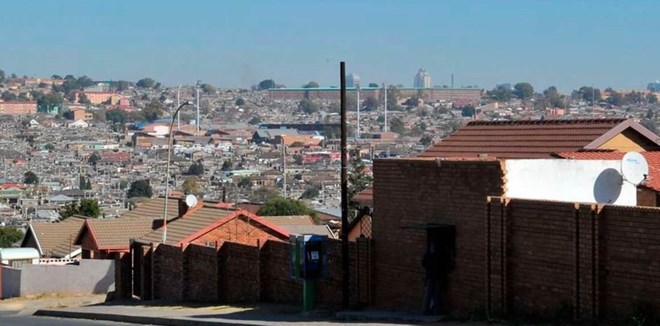The Citizen
Thursday April 15, 2021
By Charles Onyango-Obbo

A general view taken on June 11, 2012 shows the Alexandra township of Johannesburg. File | AFP
The old hostility to African immigrants by sections of South Africa has reared its ugly head again. In recent days, immigrant spaza shop (kiosk) owners, mostly Somalis, have been driven out of Atlantis, in South Africa’s Western Cape.
According to a report on the activist website GroundUp, they were given three hours to pack up and leave. Witnesses said the business owners were cheered on by some residents as they left, as the local folks know they will suffer a lack of goods at affordable prices when the Somalis leave.
That there is a reminder that these continuing attacks on immigrant businesses are fuelled by South African rivals. In the Atlantis case, GroundUp reports, local business owners had complained that Somalis were out-competing them.
There are several revealing nuggets in the story, one from a South African woman who first rented her shop to a local businessperson. The fellow didn’t pay rent for three months, then took off. Then she rented it to a Somali for R3,000 ($207) a month. Not only did he pay her rent, but he upgraded the shop and even installed a flush toilet.
On March 31 some local residents, with the police in tow, knocked on his door. They ejected him.
His name is Mowliid Omar. What he said is instructive. He revealed that he had endured xenophobic attacks before and had his stock looted in 2008 in Paarl in 2010, in Kraaifontein in 2013 (both cities in the Western Cape), and now he had been driven out of Atlantis.
There is no prize for guessing what Omar will do next. He will set up shop somewhere again. It’s a dogged spirit that has served the Somali nation well and seen many of them prosper in the places in Africa they call home, and elsewhere in the diaspora where they have been scattered by the political demons that have roamed Somalia since the start of the 1990s.
Once I asked the legendary Somali writer Nuruddin Farah where this spirit and ability of Somalis to thrive in far-away places comes from. He said it was from its nomadic traditions; in Somalia, in particular, the pastoralists of the north are easy on their feet, fiercely independent, and their adventurousness is boundless.
A friend from “Northeastern”, Kenya’s Somali country, once explained how he navigated going to a boarding school outside the region when he was young, with the realities of coming from a nomadic family. There was rarely a term that ended and he went back to find the family still in the place he left them.
Most times, they would have moved – without sending him word where they had gone. It was not a terminal problem, though. They would leave tell-tale signs and combined with tips from other Somali folks who were also roaming with their cattle, he would follow and always find them. There was almost no time spent discussing it, he said, because it was considered ordinary.
If you come up in a business contest against a chap who, in the course of going to school, had to read the signs, smell things, and study tracks to find his nomadic family probably 50 or more times, good luck beating or breaking him.
More scholarly types say that Somalis also “freeze” less because they are easily the African people who have achieved the highest form of nationhood that is not dependent on a geographical territory. That is to say, whereas for a Kenyan, for example, identity as a Kenyan needs a physical Kenya and a link with it, Somalis find themselves as a people and would do so even if Somalia didn’t exist. They are therefore less discombobulated when away from home than the rest of us, and can function fairly well. They have harnessed that to find commercial success.
It’s a fascinating argument, though I don’t fully buy it. I am more seduced by those who say nomadism, displacement, separation by borders (in Eastern Africa the Somali peoples are the most separated by borders), rich histories, and repression have created a powerful “insider-outsider” mindset that is good for business. This view holds that as outsiders, they can see the societies they live in with more detachment and sense where there is a gap. And as insiders, they can see the possibilities outside that might be profitable, with fewer blinkers on.
CJ’s is a popular café and restaurant in Nairobi. It’s owned by a Ugandan-Somali. In Uganda, it operates as Café Javas, so it couldn’t carry that name to Kenya because of trademark disputes with Java House. In Uganda, it’s so wildly popular, pre-pandemic it had branches that opened 24 hours.
On Café Javas’ menu, the food items are several times more than the drinks, and many think its portions are generous. So, what does it do that other cafes don’t? Well, most other cafes sell you food with your coffee. Café Javas sells you coffee with your food. Perhaps it only an insider-outsider who could flip the script that way.